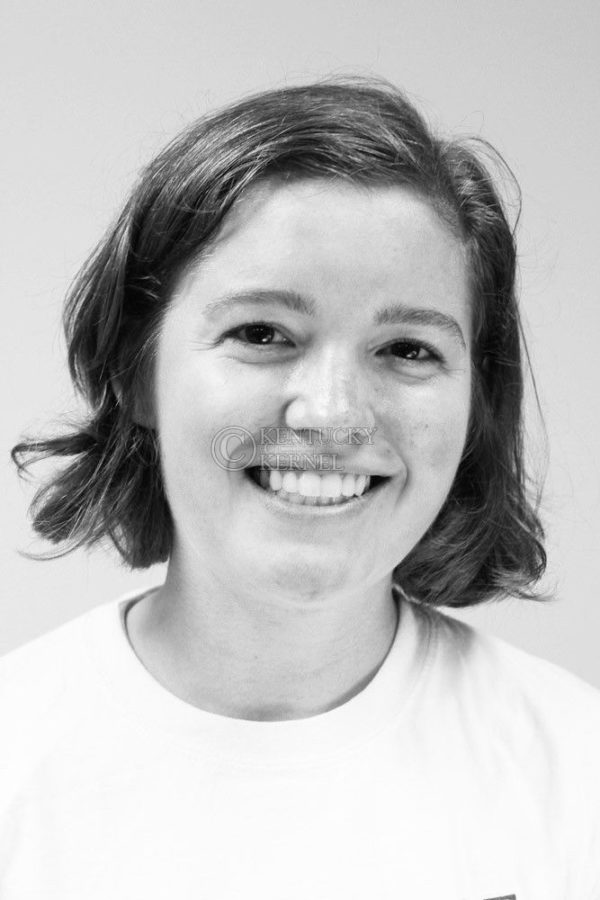Prenatal health takes priority over veganism for actress Natalie Portman
University of Kentucky student Shannon Frazer, pictured in the Kernel office on 10/14/09. Photo by Ed Matthews
April 14, 2011
Natalie Portman seems to be the “it” girl lately. And who can blame her? — She’s been featured in numerous films in the last year alone (namely, “Black Swan,” “No Strings Attached,” “Your Highness” and “Thor”).
She won for Best Actress in a Leading Role at the 2011 Golden Globes, Screen Actors Guild Awards and Academy Awards for her “Black Swan” character, Nina Sayers.
Not to mention, she’s pregnant with a child conceived with one of her “Black Swan” dancing co-stars.
The latest bit of hubbub concerns her choice to “temporarily” give up her vegan lifestyle for vegetarianism while pregnant. This choice has met much (unnecessary and uneducated) criticism.
First off, for those of you less familiar with the dietary classifications, vegetarianism omits meat products (which may or may not include fish). Vegans, on the other hand, exclude all animal products (including meat, milk, honey and eggs).
Couple such restrictions with pregnancy cravings and you start to justify Portman’s relaxed dietary regimen.
She even explained in a recent Vibe Magazine article that her choice to go veggie was to ensure she got enough iron and Vitamin B12 for a healthy pregnancy — her baby is due in summer 2011 — and because she began craving eggs and dairy again when she became pregnant.
What surprises me most about people’s reaction to Portman’s decision is the claim that she is somehow abandoning a niche lifestyle.
Critics say that if Portman sticks with the less stringent vegetarian plan after she has her baby, then the only prominent stars that will remain with a vegan following will be Lea Michelle and Moby.
Oh, cue the end-of-the-world music, why don’t you?
What a load of nonsense. If these same doubters followed Portman because of the impression that she was a lifelong vegan, they are clearly mistaken.
In that same Vibe Magazine article, Portman said that she chose to adopt veganism after reading Jonathan Safran Foer’s book “Eating Animals” (published in 2009).
According to an October 2009 Huffington Post article written by Portman about Foer’s book, she revealed her 20-year dedication to the vegetarian — not vegan—lifestyle.
“(Foer) reminds us that our food is symbolic of what we believe in, and that eating is how we demonstrate to ourselves and to others our beliefs,” Portman said.
So true. My good friend is a vegan, and I see her activism as refreshing and inspiring.
Perhaps doubters believe Portman will lose some degree of this same activist-mentality in her decision to change her diet, or that she is “tainting” her diet by reintroducing eggs and dairy, but those assumptions are ignorant, too.
For instance, the American Heart Association’s website cites several studies, which deduce that vegetarians have significantly lower odds for obesity, heart disease and diabetes.
Because vegetarians are restricted on their food groups (no meat and little, if any, dairy), they tend to eat more varieties of fruits, vegetables and grains — the stuff that is nutritionally good for them.
According to the nonprofit organization EVOLVE!, vegetarianism may be a practical solution to ending world hunger.
“It would take just 40 million tons of food to eliminate the most extreme cases of world hunger,” says EVOLVE!’s website. “Yet a staggering 760 million tons of grain will be used to feed farmed animals this year (compared to 100 million tons used to produce fuel).”
So cutting out even a fraction of the for-consumption animals would lend more food resources for the rest of the world’s population.
The aid group Vegfam shared these sentiments. “A ten-acre farm can support 60 people growing soybeans, 24 people growing wheat, 10 people growing corn and only two people producing cattle,” Vegfam pointed out. “Reducing meat production by just 10 percent in the U.S. would free enough grain to feed 60 million people, estimates Harvard nutritionist Jean Mayer.
Sixty million people — that’s the population of Great Britain, which, by the way, could support 250 million people on an all-vegetable diet.”
If these and other startling statistics aren’t marks of activism, I don’t know what is.
I say let Portman be. Whatever her pregnancy and post-pregnancy dietary plans are, she’s still taking so many more health and ethical precautions than the average pregnant woman in maintaining her vegetarianism.
She’s a smart girl — she studied at Harvard after her 1999 Queen Amidala role in “Star Wars: Episode 1 —The Phantom Menace,” after all.
And chances are, whatever the outcome from her dietary choices, she will still continue to enjoy much Hollywood success in the future, upholding her “it girl” status.




















































































































































